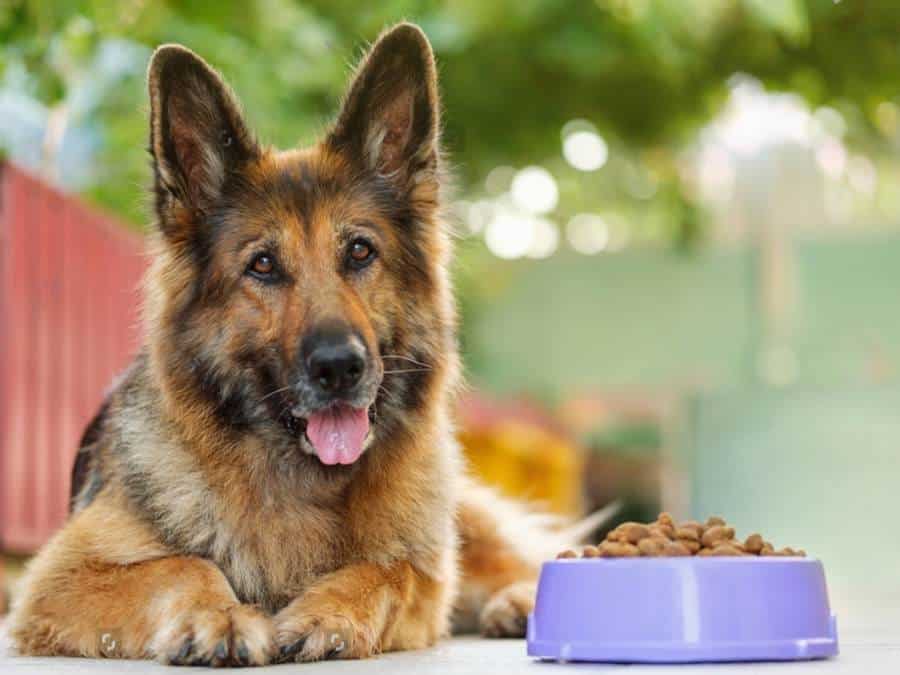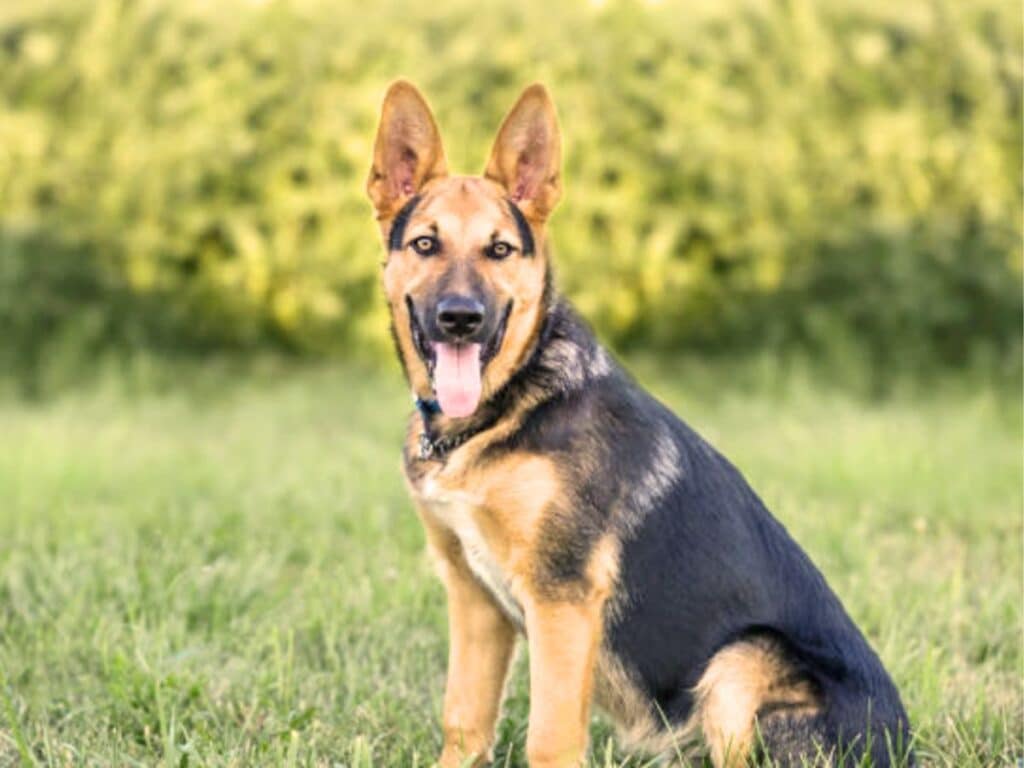Since I have been a parent to three German Shepherds, new GSD parents (or aspiring parents) tend to ask me this particular question, a lot!
What do German Shepherds eat?
Well, the good news is that German shepherds are not very picky when it comes to their food choices. The best part is that they can consume a variety of foods and still maintain good health. The key to feeding a healthy diet is variety and balance over time.
The first step to evaluating dog food for your German Shepherd is to make a list of the things that are most important to you. Lifestyle, economic status, age and health of your dog, and comfort level are important.
What Do German Shepherds Like To Eat?
German Shepherds generally enjoy eating high-quality commercial dog food, protein-rich sources like lean meats such as chicken, egg, fish, beef, turkey, and lamb, and they also relish a variety of vegetables like carrots, broccoli, and sweet potatoes. GSDs also appreciate the occasional treat, such as small amounts of cheese or peanut butter, or other dog treats.
German Shepherds are working dogs. Like athletes, they require high-quality foods to maintain optimum health, strength, and endurance. They require a well-balanced diet that consists of proteins, carbohydrates, healthy fats, vitamins, and minerals.
Diet can have a direct impact on your German Shepherd’s overall performance and mental and physical well-being
It’s important to note that while they may have a hearty appetite, portion control is essential to prevent overfeeding and maintain their optimal weight.
Additionally, always consult with a veterinarian to tailor a diet that suits your individual German Shepherd’s needs and health requirements.

List of What German Shepherds Eat
German Shepherds are known for their intelligence, loyalty, and athleticism. To support their active lifestyle and overall health, providing them with a balanced diet that meets their unique nutritional requirements is crucial.
Let’s explore what German Shepherds like eating.
| Category | Items |
|---|---|
| Meat | Beef, Bison, Chicken, Duck, Lamb, Liver, Mutton, Pork, Salmon, Turkey, Tuna (cooked), Venison |
| Fish | Salmon, Tuna, Herring, Whitefish, Sardines (in water, without added salt) |
| Eggs | Eggs (raw or cooked) |
| Dairy | Cheese (Cheddar & Swiss), Cottage Cheese, Plain yogurt |
| Fruits | Apples (never the seeds), Bananas, Blueberries, Strawberries, Seedless Watermelon, Cantaloupe (remove seeds and rind), Mango (remove pit), Pineapple, Peaches (remove pit), Pears (remove seeds and core), Oranges (in moderation), Cranberries, Raspberries, Blackberries, and Papaya (remove seeds) |
| Vegetables | Asparagus, Beets, Broccoli, Brussels Sprouts, Cabbage, Carrots, Cauliflower, Celery, Eggplant, Green Beans, Lettuce, Okra, Peas, Peppers, Potatoes (cooked), Pumpkins, Spinach, Sweet Potato, Zucchini |
| Grains and Carbs | Barley, Bread, Oatmeal, Pasta (plain, cooked), Quinoa, Rice (white or brown), Millet, Amaranth |
| Nuts and Seeds | Cashews, Peanut, Almonds, Pumpkin seeds |
| Commercial Dog Food | High-quality commercial dog food |
| Miscellaneous | Carob (dog-safe alternative to chocolate) |
RELATED:
- What Fruits Can German Shepherds Eat?
- How Much To Feed a GSD? (German Shepherd Feeding Chart By Age)

Types Of Food That German Shepherds Eat
There are several types of food that German Shepherds can eat, and they can be categorized based on their formulation, preparation, and intended use.
Here are some common types of foods that German Shepherds eat:
1. Commercial Dog Food
Commercial dog food formulated specifically for large breed dogs is an excellent option for feeding your German Shepherd.
These foods are designed to meet the nutritional needs of active dogs like German Shepherds. Look for brands that use high-quality ingredients without fillers or artificial additives.
- Dry dog food, or kibble, is the most commonly fed form of dog food because it can be the most economical and requires little or no preparation time.Dry dog food usually includes a combination of meat or meat by-products, grains, vegetables, and vitamins/minerals.Kibble allows for easy portion control, making it simpler to manage your dog’s daily caloric intake.
- Wet dog foods have a higher moisture content, are more palatable for some dogs, suitable for dogs with dental issues or those who need extra hydration.Wet dog foods are generally more expensive than dry food, and have a shorter shelf life once opened.
2. Raw Diet
Some German Shepherd owners choose to feed their dogs a raw diet consisting of raw meat, bones, fruits, and vegetables.
Advocates of this approach believe that it mimics what dogs typically eat in the wild and can lead to improved digestion and overall health.
Raw diet requires careful handling to avoid bacterial contamination, and may not be nutritionally balanced unless formulated correctly.

3. Homemade Food
Preparing homemade meals for your German Shepherd can be another option if you prefer having more control over their diet.
This allows you to choose specific ingredients and tailor the meals according to your dog’s individual needs.
4. Dehydrated or Freeze-Dried Dog Food
Dehydrated and freeze-dried dog food are both forms of dog food that have undergone a preservation process to remove moisture while retaining nutrients.
It typically contains a mix of meat, vegetables, and grains.
Dehydrated dog food usually has a longer shelf life than raw food because the dehydration process inhibits the growth of bacteria and fungi.
However, it’s crucial to consult with a veterinary nutritionist or veterinarian who can guide you in creating well-balanced meals that meet all of your dog’s nutritional requirements.
RELATED:

How Much Should a German Shepherd Eat?
As a general starting point, adult German Shepherds typically eat between 2 to 5 cups of high-quality dry dog food per day, divided into two meals. However, individual dogs may need more or less based on age, weight, activity level, type of food, and overall health.
If your dog is active, you may give him more food, but 5 cups of dog food is a recommended maximum even for a very active German Shepherd and around 2 cups is sufficient for inactive and older German Shepherds.
Below you can find the German Shepherd Feeding Chart by age that can help you decide how much food should you give to your German Shepherd according to his age.
| Age | Cups/Day | No. of Meals/Day |
| 6 – 8 weeks old | As needed | 4 – 5 times |
| 8 – 10 weeks old | 1.5 – 2 cups | 4 – 5 times |
| 10 – 12 weeks old | 2 cups | 4 – 5 times |
| 3 – 6 months | 2 – 4 cups | 3 times |
| 6 – 10 months | 3 – 4 cups | 3 times |
| 10 months – 1 year | 3 – 5 cups | 2 – 3 times |
| 1 year – 18 months & above | 3 – 5 cups | 2 – 3 times |
To know everything there is to know about German Shepherds, check out my article: German Shepherd 101 Owners Guide Book!

What can German Shepherd Puppies Eat?
German Shepherd puppies have specific dietary needs to support their growth and development. It is important to provide them with a balanced and nutritious diet to ensure their overall health. Here are some foods that German Shepherd puppies can eat:
1. High-quality puppy food: Choose a premium brand of puppy food that is specifically formulated for large-breed puppies. Look for options that contain real meat as the main ingredient and avoid those with fillers or artificial additives.
2. Lean meats: Cooked lean meats such as chicken, turkey, and beef can be included in their diet. Remove any bones, skin, and excess fat before feeding it to them. It is important to cook the meat thoroughly to eliminate any risk of bacterial contamination.
3. Fish: Fish like tuna, salmon, and sardines are excellent sources of omega-3 fatty acids, which are beneficial for a puppy’s brain development. Ensure that the fish is cooked, deboned, and served in small portions.
4. Fruits and vegetables: Incorporate a variety of fruits and vegetables into their diet to provide essential vitamins, minerals, and fiber. Some safe options include apples, carrots, blueberries, and sweet potatoes.
5. Dairy products: In moderation, some dairy products can be included in their diet. Plain yogurt or cottage cheese can be given as occasional treats, but always check for lactose intolerance or any signs of digestive upset.
6. Eggs: Eggs are a good source of protein and can be included in their diet. Cook the eggs thoroughly before feeding them to your German Shepherd puppy.
Remember to provide fresh water at all times and feed your German Shepherd puppy multiple small meals throughout the day to avoid overeating or bloating. It is crucial to

What Human Food Can German Shepherds Eat?
German Shepherds can eat human foods, but not all. Please refer to the following chart to find out which human foods are safe for German Shepherds to eat.
| Fruits | Vegetables | Other |
|---|---|---|
| Alfalfa | Asparagus | Apple juice |
| Apple | Bagel | Almonds |
| Banana | Basil | Aloe Vera |
| Apricot | Brussels Sprouts | Avocado |
| Barley | Cabbage | Baby food |
| Beans | Canola oil | Bacon |
| Beets | Cauliflower | Bread |
| Bell peppers | Celery | Butter |
| Blackberries | Cherries | Cashews |
| Broccoli | Clam | Cheerios |
| Brown rice | Cornmeal | Cheese |
| Cantaloupe | Cucumbers | French fries |
| Carrots | Eggplant | Green tea |
| Celery | Flax seed | Ginger |
| Cranberries | Honey | Ham |
| Cilantro | Honeydew | Chamomile tea |
| Chia seeds | Mango | Ice cream |
| Coconut oil | Oatmeal | Ginger ale |
| Cucumbers | Peas | Pancakes |
| Grapes | Peppers | Tofu |
| Kiwifruit | Potatoes | Eggs |
| Lemon | Spinach | Chicken |
| Lime | Tomatoes | Bacon |
| Orange | Rice | Bread |
| Papaya | Squash | Lactose-free milk |
| Pear | Zucchini | Milk |
| Pineapple | Yogurt | |
| Raspberries | ||
| Strawberries | ||
| Watermelon |

What Can German Shepherds Not Eat?
While German Shepherds can generally eat a variety of foods, some foods should be avoided as they can be harmful or even toxic to them.
It’s important to note that individual dogs may react differently, and some may have sensitivities or allergies to certain foods.
Here are some common foods that German Shepherds should avoid:
| Acorns | Chocolate | Avocados |
| Onions and Garlic | Grapes and Raisins | Milk and other Dairy Products |
| Macadamia Nuts | Sugary foods and drinks | Caffeine |
| Yeast dough | Salt | Tea |
| Walnuts | Potato skins | Raw potato |
| Raisins | Gum | Mushrooms |
| Beer | Xylitol | Alcohol |
| Brownies | Caramel | Cat food |
| Chips | Chocolate | Corn cobs |
| Doritos | Fat trimmings | French fries |
| Granola | Grapefruit | Grapes |
| Ginger ale | Human vitamins | Jalapeno |
| Ketchup | Table scraps | Lemons |
| Marshmallows | Milkshake | Mints |
| Nachos | Nutmeg | Oreos |
| Pecans | Pepperoni | Pickles |
| Pizza | Pomegranate | Pretzels |
| Rhubarb leaves | Salami | Salt |
| Sausage | Skittles | Soda |
| Sugar | Tacos | White chocolate |
Conclusion
So, there you have it! We’ve covered everything you need to know about what German Shepherds eat. From understanding their dietary needs to learning about the best food options for them, we’ve explored it all.
Remember, the key is to provide a balanced diet that meets their nutritional requirements. Consider their age, activity level, and any specific health concerns they may have. And don’t forget to consult with your veterinarian for personalized advice.
Frequently Asked Questions
1. What is the ideal diet for a German Shepherd?
German Shepherds thrive on a balanced diet consisting of high-quality protein, healthy fats, and carbohydrates. A diet rich in meat, supplemented with vegetables and grains, provides essential nutrients for their overall well-being.
2. Can I feed my German Shepherd a homemade diet?
Yes, a homemade diet can be suitable if carefully planned. Ensure it includes the right proportions of meat, vegetables, and grains. Consult with a vet to create a well-balanced homemade meal plan tailored to your dog’s specific needs.
3. How often should I feed my German Shepherd?
Adult German Shepherds typically thrive on two meals a day, while puppies may require three. Consistency in feeding times helps regulate their digestive system and supports a healthy feeding routine.
4. Are there specific foods German Shepherds should avoid?
Avoid feeding your German Shepherd foods toxic to dogs, such as chocolate, grapes, and onions. Additionally, limit their intake of fatty or spicy foods to prevent digestive issues.
5. What are the best food options for German Shepherds?
High-quality commercial dog foods that contain real meat as the main ingredient are generally recommended for German Shepherds. Look for formulas that offer balanced nutrition with no artificial additives or fillers. It’s advisable to choose a brand that meets the nutritional standards set by reputable organizations like AAFCO (Association of American Feed Control Officials).
Also read:




